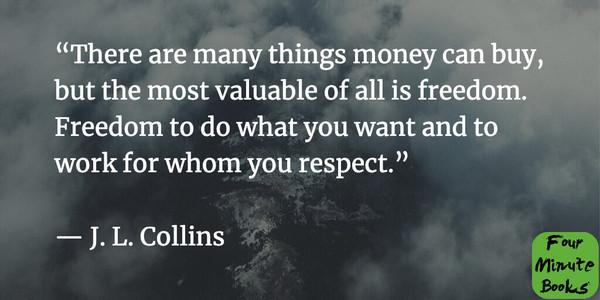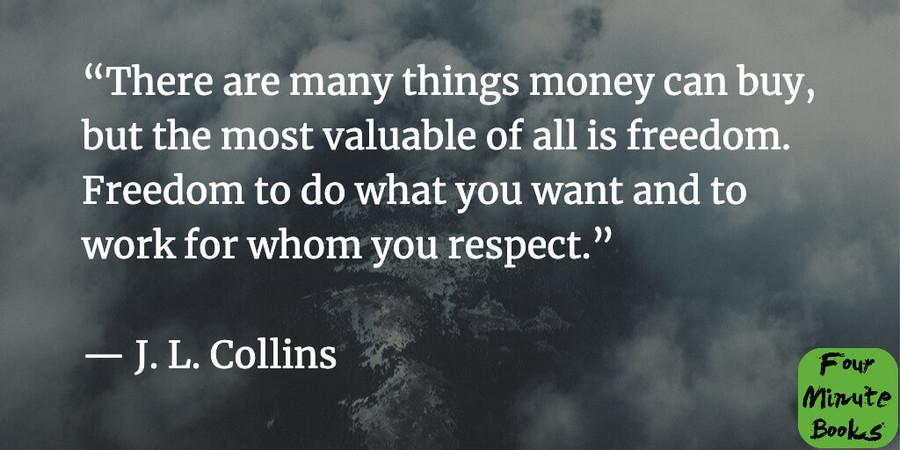The Simple Path to Wealth Summary
Curated from: fourminutebooks.com
Ideas, facts & insights covering these topics:
19 ideas
·47.5K reads
125
7
Explore the World's Best Ideas
Join today and uncover 100+ curated journeys from 50+ topics. Unlock access to our mobile app with extensive features.
Author Quote
"There are many things money can buy, but the most valuable of all is freedom. Freedom to do what you want and to work for whom you respect."
-J. L. Collins
353
4.81K reads
The Simple Path To Wealth Book Summary
The Simple Path to Wealth is a three-step template for achieving financial freedom in a straightforward way, passed from a wealthy man to his teenage daughter through a series of letters.
271
3.91K reads
Book Overview
Two childhood friends grew up and went their own ways. One became a powerful advisor to the king, the other a monk. When they meet years later, the minister feels bad for his friend. “If you learned to serve the king, you wouldn’t need to live on rice and beans,” he tries to advise him. But the monk only replies, “If you learned to live on rice and beans, you wouldn’t need to serve the king.”
341
3.4K reads
This is the opening parable J. L. Collins tells in The Simple Path to Wealth , and it is meant to make a single point: Wealth is not about power, luxury, or idling. It is about freedom. Collins thinks your freedom is the most important thing you can buy, and in this book, he offers a straightforward path to get there.
281
3.02K reads
Top 3 Book Lessons
What initially began as a series of letters to his then-teenage daughter eventually became a bestselling book, selling some 400,000 copies. Part of its appeal is that Collins’ approach is as simple as the book’s title promises. According to him, building wealth is almost inevitable if you follow three steps:
- Spend less money than you make.
- Avoid debt like the plague.
- Invest everything that’s left over into index funds.
362
3.1K reads
Lesson 1: Always spend less money than you earn.
“If your lifestyle matches—or god forbid exceeds—your income, you are no more than a gilded slave,” Collins says. He mentions Mike Tyson, one of history’s greatest boxers, who made over $300 million (!) yet still wound up bankrupt.
282
2.93K reads
I’m sure you too know someone who should have more than enough but somehow keeps complaining about how much they have to work — a symptom of wearing golden handcuffs . That’s because “You own the things you own and they in turn own you,” Collins says. Our possessions require a lot of mental and financial maintenance, and, over time, that takes a toll on us.
286
2.57K reads
The book doesn’t have a big section about budgeting, cutting back on lattes , or re-negotiating credit card rates. Collins simply appeals to our common sense. Everyone knows how much they have, and, with a few simple calculations, everyone can know , at least roughly, how much they spend. Building wealth is about making sure there’s a positive difference between the two and making sure it stays that way.
273
2.41K reads
“The beauty of a high savings rate is twofold,” Collins says. “You learn to live on less even as you have more to invest.” Collins doesn’t live a lavish lifestyle. He never even had a car payment. In exchange, he is free to choose whom he works with and how he spends his time. Collins’ savings rate is 50% of his income, and he recommends you target the same number.
From the moment you make more than you need, aim to spend less than you earn.
294
2.27K reads
Lesson 2: Get out of debt as fast as you can — and stay there.
There are many different approaches and takes on having debt. Some experts say it can be a useful tool . Others suggest you should get away from it as far as you can. Personally, I lean more towards the latter perspective, and so does Collins.
266
2.19K reads
“Carrying debt is as appealing as being covered with leeches and has much the same effect,” he writes. Therefore, whatever debts you have, you should get out of as quickly as you can . As soon as you’re debt-free, the surplus you can invest into the stock market each month will start growing.
268
2.03K reads
Collins also addresses three kinds of debt we usually consider “good debt,” aka money we borrow to use towards productive ends: business loans, student loans, and mortgage loans. The first kind must be handled with great care. The second should not even exist, as it only inflates the cost of education and forces people into jobs they’d never take years after they’re done with college.
262
2.05K reads
As for the third, Collins suggests buying “the least house to meet your needs rather than the most house you can technically afford.” He thinks of “house” like “apples:” Something you can buy in any quantity but that, the more of it you buy, will hamper you financially for more and more years.
If you’re (still) debt-free, try and stay there. If you’re in debt, try to pay it off quickly, then focus on growing your wealth.
272
1.97K reads
Lesson 3: Invest most of your savings into index funds
Sometimes, I hate belaboring the same point over and over again, but it is in countless finance books for a reason: index funds , index funds , index funds ! Collins is no exception. He, too, is part of the large crowd of finance experts making investments in index funds the backbone of their wealth-building strategy.
281
1.97K reads
Collins recommends the Vanguard Total Stock Market Index Fund, ticker symbol VTSAX , or its according exchange-traded fund, the VTI . As long as you’re in the wealth accumulation stage, where you’re trying to grow a nest egg 25x the size of your annual expenses, you should allocate 100% of your investments into this vehicle tracking all US stocks, he says.
311
1.92K reads
“This will be much, much harder than you think,” Collins reminds us. Even if you automate your monthly payments to your broker, during market crashes, “People all around you will panic. The news media will be screaming Sell, Sell, Sell!” But if you stay the course, you’re likely to succeed. Historically, the stock market has always worked out in favor of those who favor it long enough.
272
1.76K reads
Once you reach your portfolio goal, say $1,000,000, you can safely withdraw 3-7% each year while still growing your assets, Collins claims, relying on the 4% rule tested by a famous study . Now, all that’s left is to enjoy your newfound freedom!
“Spend less than you earn—invest the surplus—avoid debt.” That’s the simple path to wealth in a nutshell, and I hope you’ll get to walk it all the way to the end.
313
1.77K reads
The Simple Path to Wealth - Book Review
Like The Wealthy Gardener , this book was written from a parent to their child. Those always make for a powerful read. If you like straightforward, conversational advice with a humorous tone, I think you’ll really enjoy this book.
260
1.6K reads
Who would I recommend our The Simple Path to Wealth to?
The 24-year-old recent college graduate who’s about to get his first big paycheck, the 45-year-old who still has surprisingly much time left until retirement, and anyone looking for a timeless, simple investing formula that works.
258
1.74K reads
IDEAS CURATED BY
CURATOR'S NOTE
The Simple Path To Wealth - Book Summary
“
Tom Joad's ideas are part of this journey:
Learn more about philosophy with this collection
Understanding the concept of the self
The importance of living in the present moment
The illusion of control
Related collections
Similar ideas
5 ideas
4 ideas
Everything You Need to Know About Wealth Building
lynalden.com
2 ideas
How I Build Wealth In 4 Steps
medium.com
Read & Learn
20x Faster
without
deepstash
with
deepstash
with
deepstash
Personalized microlearning
—
100+ Learning Journeys
—
Access to 200,000+ ideas
—
Access to the mobile app
—
Unlimited idea saving
—
—
Unlimited history
—
—
Unlimited listening to ideas
—
—
Downloading & offline access
—
—
Supercharge your mind with one idea per day
Enter your email and spend 1 minute every day to learn something new.
I agree to receive email updates

